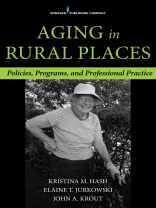Research documents that rural elders are poorer, live in less adequate housing, and have far fewer health and service options available to them than their urban counterparts, yet there is a critical lack of current and detailed information on the problems facing rural elders and on the professional practices that serve this population. This text fills this gap by introducing readers to rural areas and their residents and discussing the issues, programs, and policies designed to meet their needs. Through a multidisciplinary lens, it examines and defines specific competencies required for successful work with older adults and their families in these communities.
The text presents a research-driven, competency-based approach for the health and human service professionals who work with older rural residents. It discusses both the problems facing older adults and their families and evidence-based solutions regarding policy and best practices. Key issues examined include health and wellness, transportation, housing, long-term care, income, employment, and retirement, along with the needs of special populations (ethnic minorities, immigrants, and the LGBT population). Case examples reinforce an interdisciplinary model that addresses practice with rural elders that encompasses professional competencies, values and ethics, and the roles of a spectrum of health and human service professionals. The text also examines current policies affecting health and social services to rural elders and recommendations for policy change to build an effective health and human service workforce in rural communities. In addition, the text provides discussion questions, Power Point slides, a test question bank, and suggested activities and exercises.
Key Features:
- Fills a vacuum regarding information on health and social services for rural elders
- Provides current and comprehensive knowledge about issues besetting this population and programs and policies designed to meet their needs
- Examines and defines specific competencies required for effective health and social services
- Based on a research-driven, competency-based, interdisciplinary approach to policy and best practice
İçerik tablosu
‘
List of Contributors
Preface
Foreword by Graham Rowles
Acknowledgments
PART I: INTRODUCTION
1. What is Rural?: Introduction to Aging in Rural Places
An Aging World
Definitions of Rural
Spatial Distribution of the Older population
Rural Population Change and Variation
Plan of the Book
Conclusions
Useful Websites
2. Who are Rural Elders?
Case Study
Introduction
Challenges for Rural Elders
Opportunities and Strengths
Diversity among Rural Elders
Conclusions
Useful Websites
PART II: HEALTH AND HUMAN SERVICE NEEDS OF RURAL ELDERS
3. Health and Wellness among Rural Elders
Case Study
Introduction
Health Disparities
Behavioral Health
Screening Issues
Access to Health Care
Health Status
Social/Familial Issues
Environment
Stoicism and Survival
International Perspectives
Policies
Conclusions
Useful Websites
4. Housing, Poverty, and Transportation in Rural Places
Case Study
Housing
Poverty
Transportation
Recommendations
Useful Websites
5. Work, Retirement, and Leisure in Rural Places
Case Study
Introduction
Rural America
Employment
Retirement
Leisure and Recreation
Conclusions
Useful Websites
Part III: PROVIDING HEALTH AND HUMAN SERVICE NEEDS TO RURAL ELDERS
6 Providing Services to Rural Elders
Case Study
Introduction
Service Needs of Rural Elders
Service and Service Utilization
Barriers to Services for Rural Elders
Conclusions
Useful Websites
7. Providing Services to Well Elders in Rural Areas
Case Study
Introduction
Recreation
Socialization
Education and Lifelong Learning
Work and Employment
Conclusions
Useful Websites
8. Providing Services to Frail Elders in Rural Areas
Case Study
Introduction
Acute Care
Long-term Care
End of Life Care
Conclusions
Useful Websites
Part IV. COMPETENT PRACTICE IN RURAL AREAS
9. Interdisciplinary Teams Caring for Rural Elders
Case Study
Introduction
Models of Teamwork
Health Literacy
Recruitment and Training of Professionals in Rural Areas
Conclusions
Useful Websites
10. Role of the Health Care Professional
Case Study
Introduction
Health Care Practice with Rural Elders
Professional Competency
Conclusions
Useful Websites
11. Role of the Human Service Professional
Case Study
Introduction
Social Work Practice with Rural Elders
Professional Competency
Competency and Evidence-based Practice for
Geriatric Social Work in Small Towns and Rural Areas
Conclusions
Useful Websites
Part V: CONCLUSIONS AND FUTURE DIRECTIONS
12. Policies Impacting Rural Aging
Case Study
Introduction
Older Americans Act
Medicare
Long-term Care
Mental Health
Caregiver Support
Transportation
Social Security Act
Americans with Disabilities Act
Affordable Care Act
Food Subsidies
Competencies to Improve Policies
Conclusion
Useful Websites
13. Conclusion and Future Directions
INDEX
‘Yazar hakkında
John A. Krout, Ph D, is Professor of Gerontology and Director of the Gerontology Institute at Ithaca College.












